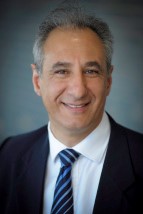A decade since the financial crisis began to subside, “the system is basically OK,” Andy Agathangelou says. But it still “needs to be fixed.”
Agathangelou in 2015 formed the Transparency Task Force to keep pounding on that message. A U.K.-based think tank that, true to its name, is open about its modest budget and sources of funding, the TTF defines its mission as “to help protect consumers' financial interests by reforming the financial services industry around the world, through harnessing the transformational power of transparency.”
It takes a big and geographically dispersed array of voices to keep the campaign going on a global scale, and Agathangelou, whose title is founding chair, is succeeding on that score, at least. A network of well over 100 volunteer ambassadors supports the cause. Agathangelou hopes to build that group to 1,000.

A few representative names: in the U.K., veteran risk adviser Markus Krebsz and Z/Yen Group executive chairman Michael Mainelli; in the U.S., Kara Tan Bhala, president and founder, Seven Pillars Institute for Global Finance and Ethics, and Matthew Murray, co-founder, Center for Business Ethics and Corporate Governance; in Australia, David Knox, senior partner, Mercer.
“I believe this is an effort fully worthy of all of our support,” says U.S.-based ambassador and longtime risk professional David Rowe, president of David M. Rowe Risk Advisory.
Series of Meetings
TTF has built momentum by holding more than 40 conferences since its inception. The latest round of day-long events, on the theme of “How can we accelerate the rebuilding of trust and confidence in financial services?” began in Washington, D.C. on September 10 - presenters included Knut Rostad, president, Institute for the Fiduciary Standard; and Allan Mendelowitz, president, ACTUS Financial Research Foundation and former chairman of the Federal Housing Finance Board. Other meetings were held in New York and Boston, with October dates scheduled in Hong Kong, Sydney and Melbourne.
“Transparency is coming to the corporate and investor worlds, as it has hit other fields, as a result of public, regulatory, NGO, and social media pressure,” Stephen Davis, associate director of the Harvard Law School Programs on Corporate Governance and Institutional Investors, said in a testimonial. “TTF convenes professionals from diverse disciplines for collective brainstorming on how to make transparency into an asset.”
Agathangelou, who before founding the task force was promoting pension standards in the U.K., is wary of complacency - that “pretty much everyone is dropping the ball on risk” - and says the solution requires market participants, technology and academia “to be on the same page.”
Transparency is seen as a pre-requisite for fairer, safer, more stable and more efficient, fairly valued markets and better outcomes. That would help reverse a trust deficit that has been building for decades through regulatory capture, short-termism, and hidden and excessive risks and costs. Agathangelou finds particularly disturbing “a short-term, shareholder-primacy agenda” that puts “profits before principles and money before morals.”
Book Project
The task force's signature project is a book, scheduled to be published next year and updated annually, laying out an evolving framework and principles for financial reform. “It will be in keeping with the broad approach of the task force about asking where we are now, where do we want to get to, and how do we get there,” says the TTF founder.
The committee of writers includes Andreas Hoepner, professor of operational risk, banking and finance, University College Dublin; Paul Moxey, visiting professor of corporate governance, London South Bank University; Tamar Joulia-Paris, a risk management consultant, UniversitÉ Saint-Louis, Brussels professor, and Dexia Bank director; and Laurence Wormald, an investment risk management consultant formerly of Deutsche Bank and FIS.
Agathangelou says the message will be targeted at the 1,000 most influential people who could bring about change in the financial system, including politicians, policymakers, regulators, and leaders of major trade bodies, professional associations and commercial organizations.
“We have been managing symptoms, not causes,” he says. While he believes that the vast majority of financial firms and managements are ethical, he is concerned that they pay a heavy reputational price for the conduct of the "mischievous minority.”
“There are far more dolphins in the system than sharks,” he says, “but the dolphins aren't organized.”